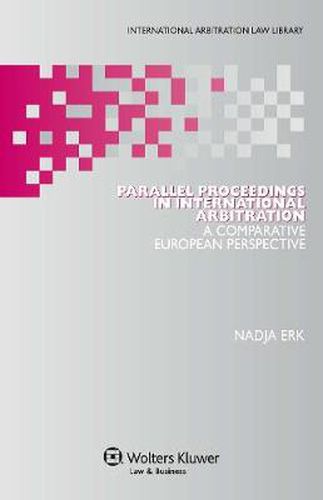Readings Newsletter
Become a Readings Member to make your shopping experience even easier.
Sign in or sign up for free!
You’re not far away from qualifying for FREE standard shipping within Australia
You’ve qualified for FREE standard shipping within Australia
The cart is loading…






This title is printed to order. This book may have been self-published. If so, we cannot guarantee the quality of the content. In the main most books will have gone through the editing process however some may not. We therefore suggest that you be aware of this before ordering this book. If in doubt check either the author or publisher’s details as we are unable to accept any returns unless they are faulty. Please contact us if you have any questions.
This book depicts and evaluates, in a European context, the pleas and actions which parties may make use of to dissolve the parallel jurisdiction of a national court and an arbitral tribunal. The author undertakes a thorough comparative analysis of the motivations for, and practice of, such pleas and actions with special regard to the major hubs where elaborate arbitration laws are tried and tested by the arbitration community - Germany, France, Switzerland, and England. On the basis of four scenarios of parallel proceedings before national courts and arbitral tribunals, the analysis tackles such issues and topics as the following: motivations for initiating parallel proceedings from the various parties’ perspectives; remedies available to parties in situations of jurisdictional conflicts; effect of the principle of competence-competence on national courts’ review of arbitration agreements; pleas restricting national courts’ exercise of jurisdiction to a review of core principles (arbitration defence); self-restraining pleas independent of an arbitration agreement (plea of litispendence); actions for declaratory relief; actions aimed at restraining another court’s or tribunal’s jurisdiction (anti-suit/anti-arbitration injunctions); pleas invoked to avoid procedural inefficiencies and inconsistencies (plea of res judicata); counsel’s duty of care and arbitral tribunal’s mandate to issue an enforceable award; and litigation culture versus arbitration-friendliness. Throughout, the author underlines the importance and applicability of relevant multinational and supranational conventions, institutional arbitration rules, the International Law Association’s recommendations, national laws in force and national courts’ case law including the case law of the European Court of Justice as regards the interface of arbitration and the Brussels Regulation. In its focus on the jurisdictional pleas and actions available where proceedings on the same subject matter and between the same parties are pending both before a national court and an arbitral tribunal, this book has no peers.
$9.00 standard shipping within Australia
FREE standard shipping within Australia for orders over $100.00
Express & International shipping calculated at checkout
This title is printed to order. This book may have been self-published. If so, we cannot guarantee the quality of the content. In the main most books will have gone through the editing process however some may not. We therefore suggest that you be aware of this before ordering this book. If in doubt check either the author or publisher’s details as we are unable to accept any returns unless they are faulty. Please contact us if you have any questions.
This book depicts and evaluates, in a European context, the pleas and actions which parties may make use of to dissolve the parallel jurisdiction of a national court and an arbitral tribunal. The author undertakes a thorough comparative analysis of the motivations for, and practice of, such pleas and actions with special regard to the major hubs where elaborate arbitration laws are tried and tested by the arbitration community - Germany, France, Switzerland, and England. On the basis of four scenarios of parallel proceedings before national courts and arbitral tribunals, the analysis tackles such issues and topics as the following: motivations for initiating parallel proceedings from the various parties’ perspectives; remedies available to parties in situations of jurisdictional conflicts; effect of the principle of competence-competence on national courts’ review of arbitration agreements; pleas restricting national courts’ exercise of jurisdiction to a review of core principles (arbitration defence); self-restraining pleas independent of an arbitration agreement (plea of litispendence); actions for declaratory relief; actions aimed at restraining another court’s or tribunal’s jurisdiction (anti-suit/anti-arbitration injunctions); pleas invoked to avoid procedural inefficiencies and inconsistencies (plea of res judicata); counsel’s duty of care and arbitral tribunal’s mandate to issue an enforceable award; and litigation culture versus arbitration-friendliness. Throughout, the author underlines the importance and applicability of relevant multinational and supranational conventions, institutional arbitration rules, the International Law Association’s recommendations, national laws in force and national courts’ case law including the case law of the European Court of Justice as regards the interface of arbitration and the Brussels Regulation. In its focus on the jurisdictional pleas and actions available where proceedings on the same subject matter and between the same parties are pending both before a national court and an arbitral tribunal, this book has no peers.